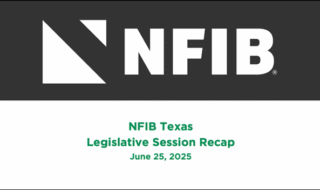February 15, 2025
State Director Anthony Smith reports from Salem on the small business agenda
February 14 was Day 25 of the 160-day 2025 Oregon Legislative Session and not only was it Valentine’s Day, but it was also Oregon’s 166th birthday! The Oregon Territory became the State of Oregon on February 14, 1859, making it the 33rd state in the union. Fun fact: Oregon shares a birthday with just one other state, Arizona, which became the 48th state in 1912.
Here’s what’s been happening in the Oregon Capitol – and what’s coming up:
Unemployment Benefits for Striking Workers
In our last update, we previewed SB 916. Since then, there have been two public hearings on the bill. An information meeting scheduled for Feb. 13 was cancelled due to snow but was rescheduled for February 18. The Senate Committee on Labor and Business will hear from the director of the Oregon Employment Department and the director of the department’s Unemployment Insurance Division about how the bill would impact Oregon’s Unemployment Insurance system.
As reported in this article from Salem’s Statesman Journal, Oregon’s labor unions are aggressively lobbying for this major policy change, but thankfully, we have a strong coalition of public and private employers who are pushing back on these efforts – and the press is doing a good job reporting the perspectives of both sides, including this excerpt:
“Allowing UI benefits for workers who voluntarily leave their jobs to go on strike would not only add cost to the system, but it would also tip the balance in favor of unions during contract negotiations,” said Anthony Smith with the NFIB.
Smith also said the bill would “unfairly” shift the obligation to subsidize union work stoppages to employers when common practice is for unions to have strike funds collected from member dues.
You can click here to view NFIB’s full testimony – and we’re still asking members to contact their legislators and urge them to vote NO on SB 916!
Estate Tax Update: A Flurry of Activity
This is another issue we previewed in the last report, and I’m happy to report there seems to be a growing interest in reforming Oregon’s worst-in-the-nation death (estate) tax. The House Committee on Revenue has held public hearings on two bills that would make changes in the right direction on this policy. Not to be outdone by the House, the Senate Committee on Finance and Revenue has held public hearings on five good bills. NFIB testified in support of all seven. Here is a very brief summary of each:
— HB 2093 – estate tax “study” bill (a placeholder for amendments)
— HB 2301 – $7 million exemption threshold & flat 7% tax rate
— SB 124 – raises the exemption threshold and indexes the threshold to inflation
— SB 380 – raises the threshold, phasing out the additional exemption for larger estates
— SB 405 – raises the exemption threshold to $13.61 million (same as below)
— SB 648 – raises the exemption threshold to $13.61 million (same as above)
— SB 764 – creates an exemption for the value of a family-owned business.
Here’s a link to the most comprehensive version of NFIB’s testimony for these bills, but if you’re more in the mood for a two-minute video version, you can click here.
The First “Sue Your Boss” Bill of 2025
Unfortunately, bad ideas from the past have a way of popping back up in the Oregon Legislature, and this is especially true of bills brought forward by interest groups and plaintiffs’ lawyers that want to sue businesses in new and inventive ways – much to the detriment of our members.
This is the case for HB 3187, which seeks to make age discrimination, which is already illegal in employment law, more illegal. In Oregon, workplace age discrimination protections begin at age 18. In contrast, federal protections don’t kick-in until age 40. So, in Oregon, an employer can already face a discrimination lawsuit from someone alleging discrimination for being too young or too old!
But the part that makes HB 3187 so egregious is that it seeks to redefine what “because of age” means under Oregon law to include (but not limited to) salary and/or length of service as a “proxy for age.” The result of including non-age factors as “proxies for age” is that employers are going to find themselves in no-win situations where regardless of who they hire for the job, other applicants will find it much easier to sue (and win in court) based on age discrimination.
HB 3187 is scheduled for its first public hearing February 19 in the House Committee on Labor and Workplace Standards. NFIB will be testifying in opposition.
Past Legislative Reports
February 1—Oregon Legislators Begin Work on 2,500 Bills
NFIB is a member-driven organization advocating on behalf of small and independent businesses nationwide.
Related Articles














